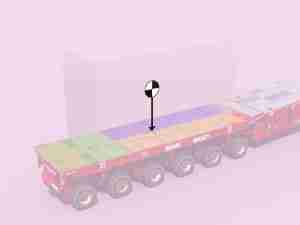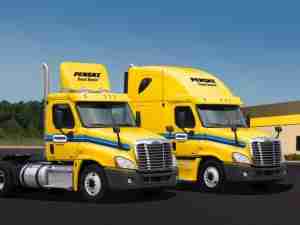Autonomous truck technology pilot a success
posted by AJOT | Nov 17 2017 at 03:25 PM | Intermodal
Embark announced a partnership with Frigidaire®, a leading household appliance brand, and Ryder System, Inc., a leader in commercial fleet management, dedicated transportation, and supply chain solutions, piloting a series of automated driving technology tests. During the pilot, Frigidaire® refrigerators were successfully transported 650 miles at a time, in semi-trucks using automated driving technology.
Beginning in October, the pilot has involved several trips of appliances traveling through four states using Embark automated tractors on the highway segments and Ryder tractors and drivers on surface streets. The pilot focused on highway driving, which is more structured, allows for faster commercialization, and solves a critical challenge for the freight industry.
“Trucking is facing a workforce problem,” said Embark’s CEO Alex Rodrigues. “More than 50 percent of all drivers will retire in the next two decades and there aren’t nearly enough young drivers joining the industry to replace them. By allowing automation to work together with local drivers to handle less desirable long haul routes, we will be able to increase productivity to address the current 50,000 driver shortage while also creating new local driving jobs that attract younger drivers for the industry.”
Operating at a Level 2 system, the pilot involved trucks with a professional driver sitting at the wheel actively monitoring the road, supervising the system, and ready to take control at any time. The team worked closely with state transportation and public safety officials in Texas, New Mexico, Arizona, and California to coordinate testing activity.
Several loads were hauled throughout October, during which the Embark automated truck traveled as many as 306 consecutive miles in automated mode, with the driver only taking over control for a mandatory stop at a port of entry.
“We believe that automated transportation will play a key role in how logistics networks function in the future,” said Dennis Cooke, President, Global Fleet Management Solutions for Ryder. “Automation will ultimately improve safety, efficiency, and sustainability for our customers who count on Ryder to provide them with guidance around new technologies such as advanced driver-assistance systems. We’re excited to be working with Embark and Frigidaire®, to demonstrate these advancements in a real-world logistics operation,” comments Mr. Cooke.
“Each year, trucks carrying our appliances travel more than 100 million miles in North America,” said Josh Benton, VP, Supply Chain at Electrolux, which manufactures Frigidaire®. “We are focused on ensuring that a reliable delivery network exists. We also want to promote a sustainable supply chain that drives growth, improves service, and adds value for our consumers.”
After the initial pilot program, Embark, Frigidaire®, and Ryder will look to increase the number of test trucks moving shipments along this freight lane in the coming months.
“Every month we’re making big strides,” said Rodrigues. “We’re working towards commercializing this technology and aim to have it operational within just a few years.”
According to The National Highway Traffic Safety Administration, more than 4,000 people a year die in heavy truck accidents and 94 percent of all accidents on U.S. roads are related to driver error.
More Regarding the Pilot Program
During the pilot, a Ryder Dedicated Transportation Solutions driver picks up a trailer filled with FRIGIDAIRE® brand refrigerators at a yard in El Paso, TX, and drives it through the city to a transition point along the I-10, which is ranked as one of the highest truck volume corridors in the U.S. At the transition point, the driver unhooks and connects the trailer to Embark’s automated truck, which then hauls the cargo 650 miles along the I-10 and hands it off to a Ryder driver at a transition point in Palm Springs, CA. The local Ryder driver in Palm Springs will then pick up the trailer to complete the final mile delivery to an Electrolux distribution center in Ontario, CA. While the Embark truck currently uses a Level 2 system operated by a properly licensed driver, this represents an important step toward a future in which fully autonomous trucks will safely navigate the highway.









